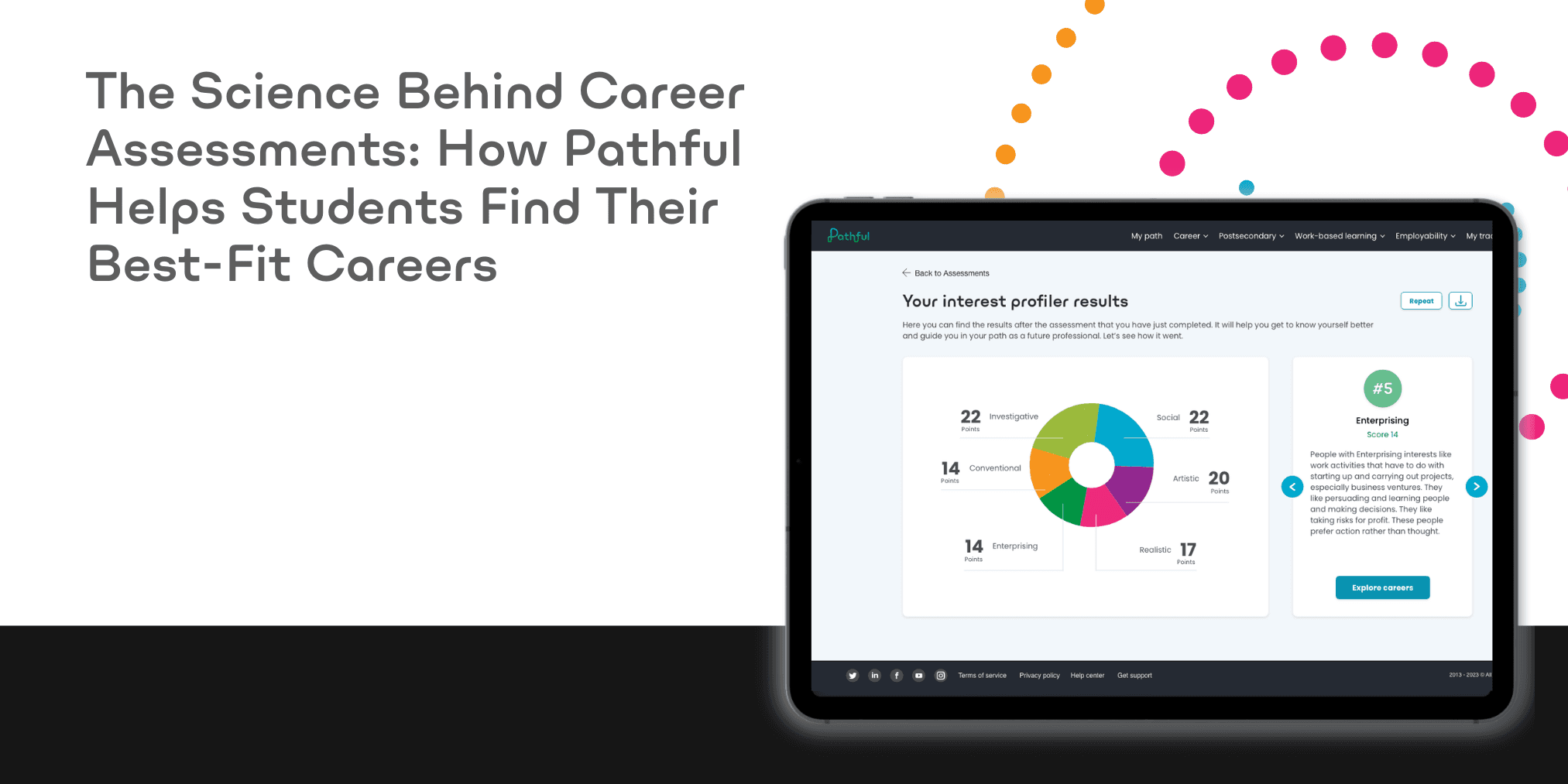The Science Behind Career Assessments: How Pathful Helps Students Find Their Best-Fit Careers
Copied Link!
The Science Behind Career Assessments: How Pathful Helps Students Find Their Best-Fit Careers
This post explores how educators can use Pathful’s assessment data to create individualized career readiness plans, customize learning paths, and integrate career exploration into the curriculum.

Career assessments are more than just interest inventories—they're sophisticated tools built on decades of psychological research and career development theory. Pathful integrates evidence-based approaches to career development, ensuring students receive guidance that's both scientifically sound and practically useful.
Evidence-Based Theoretical Foundations
Pathful's comprehensive assessment system is built on several well-established career development theories:
Holland's RIASEC Career Typology (Personality Assessment) proposes that career satisfaction comes from matching personality types with compatible work environments. People with similar personalities tend to create work environments where they can thrive alongside like-minded colleagues. Research shows individuals whose personalities align with their work environments report significantly higher job satisfaction and performance (Holland, 1997).
Gardner's Multiple Intelligences Theory (Skills Assessment) recognizes that intelligence manifests in diverse ways beyond traditional academic measures. By identifying students' intelligence profiles across linguistic, logical-mathematical, spatial, musical, bodily-kinesthetic, interpersonal, intrapersonal, and naturalist domains, Pathful recommends careers leveraging their natural cognitive strengths (Gardner, 2006).8956
Work Values Research (Work Values Assessment) consistently shows that alignment between personal and workplace values strongly predicts job satisfaction and career longevity. Pathful assesses key work values including achievement, independence, recognition, relationships, work conditions, and security (Brown & Crace, 1996).
O*NET Database Integration
Pathful's assessments are directly aligned with the U.S. Department of Labor's O*NET database, the nation's primary source of occupational information. This integration ensures:
- Career matches based on current, federally-recognized occupational data
- Accurate information about educational requirements and skills
- Direct connection to standardized occupational classifications
- Career exploration grounded in regularly updated labor market information
The O*NET Resource Center provides Pathful with detailed information on over 900 occupations, including worker characteristics, requirements, and occupation-specific information (National Center for O*NET Development, 2023).
Research-Based Impact on Student Outcomes
Scientific studies support the effectiveness of well-designed career assessments:
- Increased Career Decision Self-Efficacy: Students who complete comprehensive assessments show greater confidence in their ability to make career decisions (Betz & Luzzo, 1996)
- Reduced Career Indecision: Assessment-based guidance significantly reduces career indecision among adolescents (Gati & Saka, 2001)
- Improved Academic Engagement: Students who connect coursework to career goals through assessment show increased academic motivation (Kenny et al., 2006)
Implementation Best Practices
Educators can maximize assessment impact by:
- Contextualizing assessments within broader career development curriculum
- Using results as conversation starters rather than definitive answers
- Connecting assessment insights to real-world exploration opportunities
- Revisiting assessments periodically to track developing interests and skills

Pathful's career assessments represent the best of career development science, offering students insights based on decades of research. These research-backed tools help students explore careers aligned with their multidimensional profiles, leading to more confident decision-making and ultimately more fulfilling career journeys.
More Resources
Sources
- Betz, N. E., & Luzzo, D. A. (1996). Career assessment and the Career Decision-Making Self-Efficacy Scale. Journal of Career Assessment, 4(4), 413-428.
- Brown, D., & Crace, R. K. (1996). Values in life role choices and outcomes: A conceptual model. The Career Development Quarterly, 44(3), 211-223.
- Gardner, H. (2006). Multiple intelligences: New horizons. Basic Books.
- Gati, I., & Saka, N. (2001). High school students' career-related decision-making difficulties. Journal of Counseling & Development, 79(3), 331-340.
- Holland, J. L. (1997). Making vocational choices: A theory of vocational personalities and work environments (3rd ed.). Psychological Assessment Resources.
- Kenny, M. E., Blustein, D. L., Haase, R. F., Jackson, J., & Perry, J. C. (2006). Setting the stage: Career development and the student engagement process. Journal of Counseling Psychology, 53(2), 272-279.
- National Center for O*NET Development. (2023). O*NET OnLine. Retrieved from https://www.onetonline.org/
|
March 12th, 2025|
March 5th, 2025|
February 6th, 2025|
October 10th, 2024|
September 4th, 2024|
July 8th, 2024


